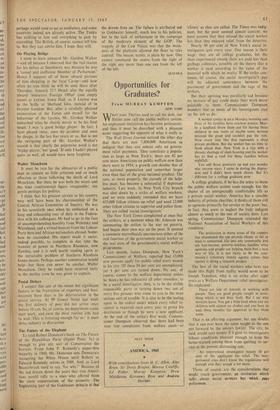Opportunities for Graduates?
From MURRAY KEMPTON
NEW YORK
WHAT your Thirties used to call the dole, our Sixties now call the public welfare system. An unpleasant institution has become permanent; and thus it must be described with a pleasant name suggesting the opposite of what it really is.
The Wall Street Journal noticed the other day that there are now 7,800,000 Americans so indigent that they can subsist only on govern- ment relief payments. They constitute a popula- tion as large as New York's; there are 42 per cent more Americans on public welfare now than there were in 1954, a growth rate double that of the national population and somewhat larger even than that of the gross national product. The care, or more properly, the custody of the help- less poor, has become a substantial if depressed industry. Last week, its New York City branch was shut down by a strike of welfare workers; and we were suddenly reminded that we have 455,000 fellow citizens on relief and need 12,000 other fellow citizens to supervise and police them. They are called 'social investigators.'
The New York Times complained at once that the strikers, at a moment when Mr. Johnson was summoning the nation to the war on poverty, bad begun their own war on the poor. It seemed a comment marvellously unconscious either of the real function of the government social worker or the real state of the government's social welfare programme.
Last month, James Dumpson, New York's Commissioner of Welfare, reported that 13,000 new persons apply for public relief every month in his city. Of these 84 per cent are unemployed; yet 4 Per cent are turned down. No one, of course, comes to the welfare department unless he thinks he has exhausted all other remedies; to be a social investigator, then, is to be the visible responsible party in turning down two out of every live persons who come to you in the most serious sort of trouble. It is also to be the testing agent in the ordeal under which every relief re- cipient is required once every year to prove his destitution as though he were a new applicant, At the end of the strike's first week, Commis- sioner Dumpson observed that there had been very few complaints from welfare cases—or
'clients' as they are called. The Times was indig- nant, but the poor seemed almost content; we must assume that they missed the social worker less than they enjoyed relief from the detective.
Nearly 40 per cent of New York's social in- vestigators quit every year. One reason is their wage; they are all college graduates, but the most experienced among them are paid less than garbage collectors, possibly on the theory that a worker is paid according to the value of the material with which he works. If the strike con- tinues, of course, the social investigator's pay will be adjusted somewhere between the parsimony of government and the rage of the strikers.
But their uprising was peculiarly sad because no increase of pay could make their work more palatable to them. Commissioner Dumpson wonders that as many of his investigators stay on the job as do:
A worker comes in on a Monday morning and three of his families have eviction notices. May- be a landlord threw them out for having three children in one room or maybe some woman misused the grant and couldn't pay the rent. Now every case like that represents a deep private problem. But the worker has no time to think about that. New York is a city with a chronic shortage of slum housing and the worker has to find a roof for three families before nightfall.
You add those pressures up and you wonder why anyone stays. I came in during the depres- sion and I didn't have much choice. But it's different for a college graduate now.
A college graduate, if he has the sense to leave the public welfare system soon enough, has the choice of an unexpectedly comfortable life as a private social worker. America has a sizeable industry of private charities; it thinks of them still as agencies primarily for service to the poor; but, in fact, they seem to neglect the truly ihdigent almost as much as the rest of society does. Last spring, Commissioner Dumpson reminded the National Association of Social Workers of this condition:
The profession in many areas of the country has abandoned the top priority clients so far as need is concerned. Go into any community and ask low-income, poverty-stricken families what agencies and people are helping them find a new way of life. It is not likely to be the com- munity's voluntary family agency unless that agency is doing a research project.
The best of the social workers who have not made this flight from reality would seem to be Joseph Tepedino, who is on strike after eight years as a Welfare Department relief investigator. He explained:
There are lots of rewards in working with people. They are good people caught in some- thing which is not their fault. But I see why workers leave. You get a little tired when you see children with almost no clothes and you have to wait three months for approval to buy them some.
That is an affecting argument, but one doubts that it can ever have the same weight as the one put forward by the union's law.yer. The city, he said, would save money if it gave its investigators labour conditions pleasant enough to keep the better-trained among them from quitting its ser- vice at the present distressing rate.
An experienced investigator rejects 50 per cent of the applicants for relief. The inex- perienced ones don't know the regulations well enough and they accept a lot more.
Those, of course, are the considerations that might touch government, an institution which talks about social services but which pays policemen.






























 Previous page
Previous page